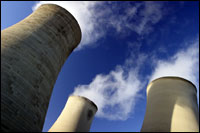Dear Umbra,
What are your thoughts on the reconsidering of nuclear power as a viable solution for helping with energy shortages and improving environmental conditions? I was shocked to hear a “scientist” say (in a “no duh,” matter-of-fact type of way) that nuclear power is far cheaper and cleaner than our current coal- and oil-based energy system. He even talked about how much radiation is leaked when burning coal.
Mark
San Francisco, Calif.
Dearest Mark,
My thoughts on the reconsidering of nuclear power: Well, like you, my head is awhirl from a recent conversation. This fascinating chat was with — real name here — Roel Hammerschlag. Roel runs the Institute for Lifecycle Environmental Assessment, a nonprofit dedicated to translating life-cycle assessments (LCAs) from dense studies to readable recommendations. Life-cycle assessments are what you, dear readers, long for when you face the choice between paper towels and hand dryers in the bathroom. In short, they are a scientific way to evaluate the energy use of an object or action over the course of its whole life. As an LCA expert, Roel lives and breathes energy analysis, and when I asked him to rank energy sources, he shocked me as your scientist shocked you. Nuclear is not out of the running for him, and here are his reasons why.

In a warming world, is coal power so bad
that it makes nuclear look good?
To Roel, and to every knowledgeable environmental writer, scientist, activist, politico, and Grist-er, climate change is the No. 1, emergency-level ecological problem. Unless we deal with this make-or-break situation, nothing else will matter. As a result, Roel says, energy sources must be evaluated with their long-term climate impact in mind. Although nuclear power produces dangerous waste that we have yet to find a way to safely manage, it does not produce greenhouse gases, as does the burning of oil, coal, and natural gas.
Here’s Roel’s rundown on the energy situation: We are going to run out of oil. Roel is of the Hubbert curve school of thought, which holds that we are halfway through the world’s oil supply and will see production dip dramatically within our lifetimes. In the 1950s, the geophysicist M. King Hubbert developed a model that took into account oil supply, use, and production. The model looks like a bell curve, and we are currently at the top of supply and production; the down slope represents the near future, in which extracting the remaining oil will no longer be worth the expense.
Given its pending disappearance, Roel says, oil is not the big bad guy. Coal is. We have about 200 to 300 years’ worth of coal available worldwide, according to both ILEA and the U.S. EPA. So there is no likelihood of actually being forced to turn from fossil fuels to renewables any time in the near future. Coal will replace oil (possibly even for powering cars, as it is currently used in methanol production and is a big player in the development of hydrogen fuel cells), the coal lobby will continue to frolic on former mountaintops, and our climate will continue to transform before our very eyes. To quote gentle Roel, “We must kill coal!” (No, Roel does not rhyme with coal.)
What options do the impending end of oil and the ecological disaster of coal leave us with — other than continuing to agitate for sane conservation measures, of course? Natural gas? For the U.S, a shift to natural gas would mean either a pipeline from Alaska to the Lower 48 or liquefied natural gas shipped from ’round the world. As it happens, we’re on track to get both — but natural gas is neither sustainable nor renewable nor carbon-free, and supplies are expected to run out shortly after oil.
Wind, solar, hydropower, and nuclear are the remaining major energy sources that could help meet current demand. Biomass fuels and tidal and geothermal energy may come into notable play in the future. The nation’s major hydro sites are all in use already (and not without their own environmental conflicts), and solar energy is still fighting to be affordable. Wind power is growing fast, but not nearly fast enough. Given all that, and given the need to eviscerate the coal industry ASAP, I’m beginning to understand Roel’s willingness to consider nuclear energy. I suspect your scientist has come to the same conclusion.
Nuclear energy already produces 20 percent of electricity in the U.S. Nuclear waste is an unsolved problem, plant meltdowns are themselves environmentally disastrous, and nuclear material can be used to nefarious and horrifying ends. But if we see climate change as the No. 1 environmental emergency, nuclear energy must, at least, be given a fair hearing. Thus, despite the fact that contemplating it makes me feel like Dick Cheney, we will return to this fissile topic anon.
Unbelievably,
Umbra


